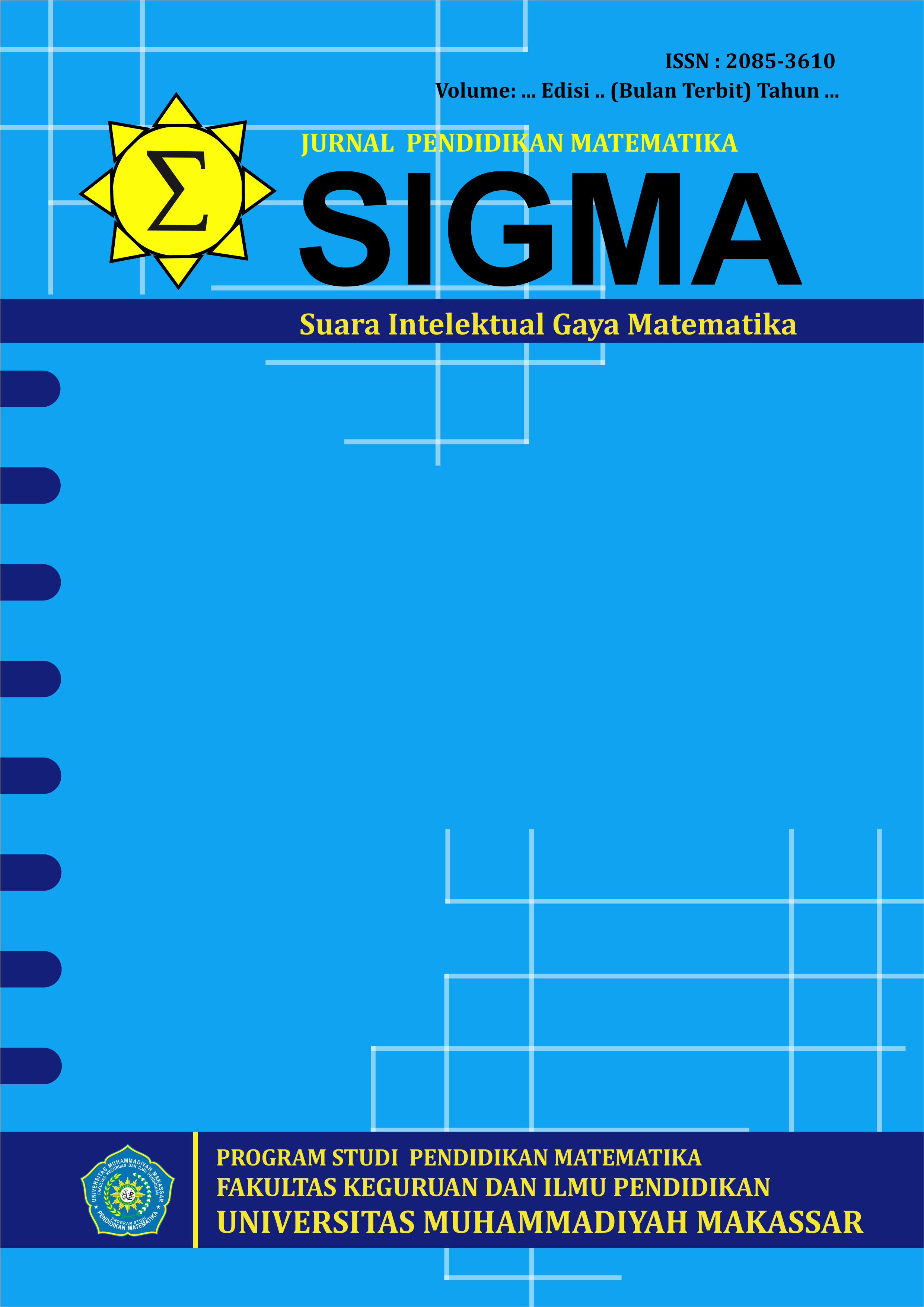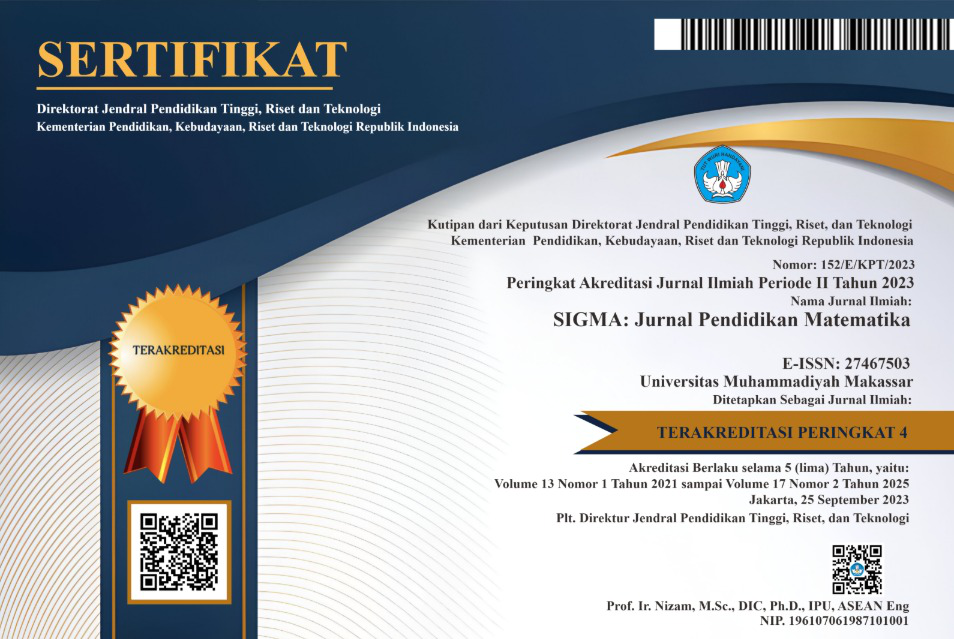MANAGEMENT OF COGNITIVE LOAD ON STUDENT’S MATHEMATICAL PROFICIENCY AT SMP NEGERI 20 KOTA SERANG
DOI:
https://doi.org/10.26618/sigma.v16i1.14560Keywords:
Management of cognitive load, mathematical proficiency, conceptual understandingAbstract
This research is motivated by the fact that the level of conceptual understanding in Indonesia is still relatively low. The low level of conceptual understanding is related to how students manage and process the information received when they studying material, considering cognitive load. Learning with attention to cognitive load is believed to enhance students' mathematical conceptual understanding. The research aims to determine whether students' mathematical conceptual understanding with cognitive load-aware learning is better than students with conventional learning, both in terms of initial ability and not. The method used in this research is a mixed-method with a sequential explanatory design. Research instruments consist of test and non-test instruments. Data were obtained from initial ability tests and conceptual understanding as test instruments and questionnaires, interviews, and documentation as non-test instruments. The results show that students' mathematical conceptual understanding with cognitive load-aware learning is better than students with conventional learning, both in terms of initial ability and not. The conclusion of the research is that the treatments given to both classes overall have yielded quite positive results in students' mathematical conceptual understanding. However, the comparison between students who received cognitive load-aware learning and those who received conventional learning shows a significant difference.
References
Apridayanti, L. (2023). Pengaruh Model Pembelajaran Strategi Genius Learning terhadap Kemampuan Pemahaman Konsep Matematis Ditinjau dari Beban Kognitif Siswa. repository.radenintan.ac.id. http://repository.radenintan.ac.id/id/eprint/31071
Asma, H., & Dallel, S. (2021). Cognitive Load Theory And Its Relation To Instructional Design: Perspectives of Some Algerian University Teachers Of English. Arab World English Journal (AWEJ) Volume. https://papers.ssrn.com/sol3/papers.cfm?abstract_id=3764232
Azis, R., Djono, D., & Purwanta, H. (2020). Pengaruh Penerapan Sistem Zonasi Dalam Penerimaan Siswa Baru Terhadap Manajemen Pembelajaran Sejarah di SMA Se-Kabupaten Sleman. Jurnal CANDI. https://jurnal.uns.ac.id/candi/article/view/44799
Azizah, N., Budiyono, & Siswanto. (2021). Kemampuan Awal: Bagaimana Pemahaman Konsep Siswa Pada Materi Teorema Pythagoras? AKSIOMA: Jurnal Program Studi Pendidikan Matematika, 10(2), 1151–1160. https://ojs.fkip.ummetro.ac.id/index.php/matematika/article/view/3662
Ball, D. L. (2002). Mathematical Proficiency For All Students: Toward A Strategic Research And Development Program In Mathematics Education. In Science and Technology Policy Institute.
Kilpatrick, J., Swafford, Jane., & Findel, Brafford. (2001). Adding It Up: Helping Children Learn Mathematics. books.google.com.https://books.google.com/books?hl=en&lr=&id=pvI7uDPo0-YC&oi=fnd&pg=PA1&dq=adding+it+up&ots=vDZ3b0tqcl&sig=XcY9in6gx6OJdnVyCa0TPx6InUM
Darling-Hammond, L., Flook, L., & (2020). Implications For Educational Practice of The Science of Learning and Development. Applied . https://doi.org/10.1080/10888691.2018.1537791
Dewintania, R. N., Rachmawati, I., & (2023). Analysis of Zoning System Implementation Policies in The Admission of New Students of Junior High School in Sukabumi City. International . https://ejournal.ipinternasional.com/index.php/ijere/article/view/437
Hendrayana, A. (2018). Mengatasi Cognitive Load pada Anak. In Serang: FKIP Untirta.
Nahdi, D. S., & Jatisunda, M. G. (2020). Conceptual Understanding and Procedural Knowledge: A Case Study on Learning Mathematics of Fractional Material in Elementary School. Journal of Physics: Conference Series. https://iopscience.iop.org/article/10.1088/1742-6596/1477/4/042037/meta
OECD. (2019). PISA 2018. PISA 2018 Result Combined Executive Summaries. PISA-OECD Publishing
OECD (2023), PISA 2022 Results (Volume I): The State of Learning and Equity in Education, PISA, OECD Publishing, Paris,https://doi.org/10.1787/53f23881-en.
Plass, J. L., & Kalyuga, S. (2019). Four Ways Of Considering Emotion In Cognitive Load Theory. Educational Psychology Review. https://doi.org/10.1007/s10648-019-09473-5
Permana, D. A., & Hendrayana, A., (2023). Pengaruh Model Problem Based Learning Termodifikasi Cognitive Load Theory Terhadap Kemampuan Pemecahan Masalah. Wilangan: Jurnal Inovasi. https://jurnal.untirta.ac.id/index.php/wilangan/article/view/19479
Rach, S., & Ufer, S. (2020). Which Prior Mathematical Knowledge is Necessary for Study Success in The University Study Entrance Phase? Results On A New Model of Knowledge Levels . In International Journal of Research in Undergraduate . Springer. https://doi.org/10.1007/s40753-020-00112-x
Ratnasari, G., & Sutirna, S. (2023). Analisis Beban Kognitif dalam Kemampuan Pemahaman Konsep Matematis Siswa. Didactical Mathematics. https://www.ejournal.unma.ac.id/index.php/dm/article/view/5334
Riyanti, E. D., Ayatina, H., Astuti, F. T., & (2020). Zoning System of Education in Indonesia Challenges and Their Future. 1st Progress in Social . https://www.atlantis-press.com/proceedings/psshers-19/125943585
Rohmatillah, N. A., Fitriyanti, R., & (2020). Peningkatan Kualitas Madrasah terhadap Sistem Zonasi MTs. Nurul Huda Sedati Sidoarjo. Jurnal Administrasi . https://jurnalftk.uinsby.ac.id/index.php/JAPI/article/view/414
Sabilla, Z., Ridwan, A., & Yusmaniar, Y. (2019). Hubungan antara Pemahaman Konsep dengan Beban Kognitif Siswa pada Materi Hidrolisis Garam. Jurnal Riset Pendidikan Kimia. http://journal.unj.ac.id/unj/index.php/jrpk/article/view/11637
Salim, F. P., & Nora, D. (2022). Dampak Penerimaan Peserta Didik Baru (PPDB) Sistem Zonasi (Studi Kasus: Penerimaan Peserta Didik Baru Sekolah Dasar di Kecamatan Matur). Naradidik: Journal of Education and . https://naradidik.ppj.unp.ac.id/index.php/nara/article/view/20
Sulistyosari, Y., Wardana, A., & (2023). School Zoning and Equal Education Access in Indonesia. International Journal of . https://ijereiaescore.org/article/view/22488.html
Sweller, J. (2011). Cognitive Load Theory. Psychology of Learning and Motivation.https://www.sciencedirect.com/science/article/pii/B9780123876911000028
Werdiningsih, R. (2020). Kebijakan Sistem Zonasi dalam Perspektif Masyarakat Pendidikan. Public Service and Governance Journal. http://jurnal.untagsmg.ac.id/index.php/psgj/article/view/1562
Westlake, S. (2019). Cognitive Load Theory and Multimedia. In Technology and the Curriculum: Summer 2019. pressbooks.pub. https://pressbooks.pub/techandcurr2019/chapter/cognitive-load/
Widyastuti, R. T. (2020). Dampak Pemberlakuan Sistem Zonasi Terhadap Mutu Sekolah dan Peserta Didik. Edusaintek: Jurnal Pendidikan . https://journalstkippgrisitubondo.ac.id/index.php/EDUSAINTEK/article/view/46
Zahara, M. N., & Hendrayana, A., (2020). The Effect of Problem-based Learning Model Modified by Cognitive Load Theory on Mathematical Problem Solving Skills. In Hipotenusa. academia.edu. https://www.academia.edu/download/74551246/pdf.pdf
Downloads
Published
Issue
Section
License
With the receipt of the article by the SIGMA: Jurnal Pendidikan Matematika Editorial Board and the decision to be published, then the copyright regarding the article will be diverted to SIGMA: Jurnal Pendidikan Matematika.
Universitas Muhammadiyah Makassar as the publisher of SIGMA: Jurnal Pendidikan Matematika hold the copyright regarding all the published articles in this journal.Universitas Muhammadiyah Makassar has the right to multiply and distribute the article and every author is not allowed to publish the same article that was published in this journal.
The manuscript authentic and copyright statement submission can be downloaded ON THIS FORM.






